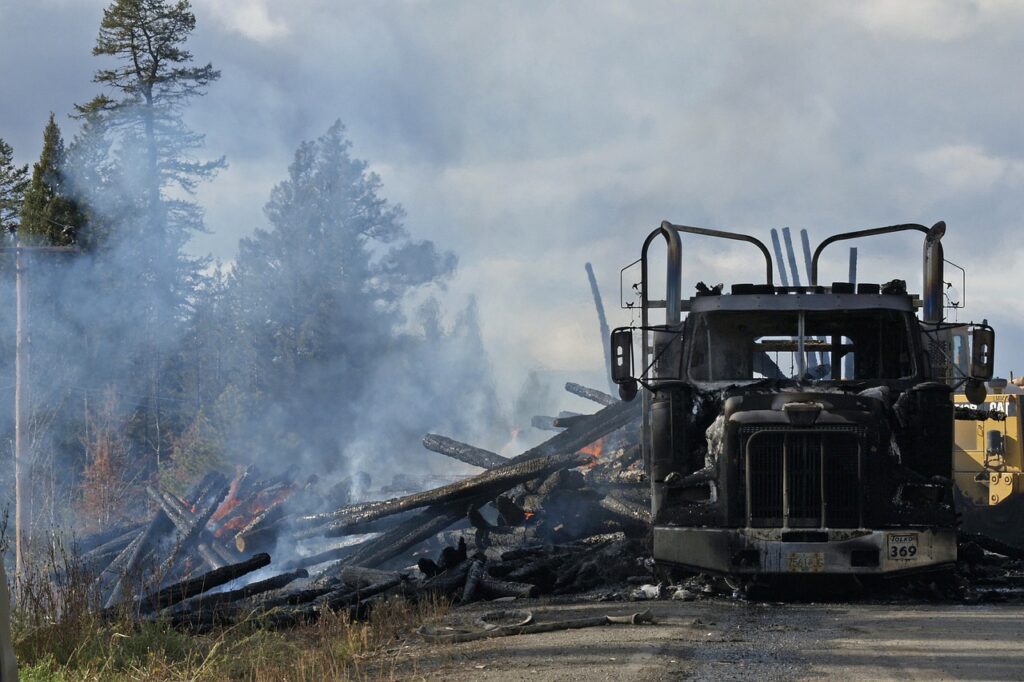DO I HAVE A CASE? Navigating a Truck Accident Settlement or Lawsuit

New Mexico is a beautiful state full of amazing views. It also is home to some of the busiest highways in the nation, including Interstates 25 and 40. Driving on these roadways often is a dangerous excursion, further complicated by contributing factors like distracted drivers and those driving under the influence of drugs or alcohol. Commercial trucks frequently are involved in accidents along these and other Albuquerque roadways. According to the most recent data from the New Mexico Department of Transportation (NMDOT), heavy trucks were involved in a total of 2,939 crashes, resulting in 56 fatalities and 745 injuries. There are several dynamics involved in assigning liability in an accident resulting in injuries or fatalities. If you were involved in an accident with a commercial truck, Romero Law Office can review the evidence to help determine if you have a case.
Number One in the Nation for Dangerous Driving
Ranking at the top of a list usually is a good thing, unless that list compiles the states with the worst drivers. In this and other similar reports, New Mexico earned the number one spot for bad driving. Failure to obey traffic laws, compounded with careless driving and drunk driving, were the top reasons New Mexico earned top billing. For 2019, NMDOT reported 424 state-wide traffic fatalities, an increase from the previous two years.
Where I-25 and I-40 meet is affectionately referred to by locals as the “Big I.” This crossroads is notorious for frequent vehicle accidents due to excessive speed, careless driving, and driving under the influence of drugs or alcohol. Albuquerque also is a popular round-the-clock thruway for commercial trucks. Put these ingredients together and it is a recipe for disaster.
Contributing Factors in Tractor Trailer Accidents
For some truckers, New Mexico is just the state they must traverse to get from Texas to California. It is a heavily traveled route for commercial trucks hauling everything from fracking waste to fruits and vegetables. Truck drivers face several challenges when traveling I-25 and I-40, including many miles between rest stops. These long and lonely roads are just one issue causing truck accidents. Some others include:
- Distracted Driving. Truck drivers can be tempted to multi-task under the assumption that it is safe to do so while traversing on straight roadways like I-25 and I-40. Calling or texting on a mobile phone, eating a snack, or fiddling with the radio are among the behaviors that lead to distraction behind the wheel.
- Fatigue. Truckers are required to follow federal regulations about resting during long hauls. There are 400 miles of roadway between Texas and California, and drivers sometimes are tempted to ignore rules to keep to a tight schedule. Tired drivers are more likely to fall asleep behind the wheel, which is dangerous when that wheel is attached to an 80,000 vehicle.
- Navigating Unknown Roadways. Locals know the “Big I” is complex and confusing, and that is for drivers who frequently travel it. For truck drivers experiencing the crossroad for the first time or who irregularly use it, navigating while maintaining control of a big rig is a tricky endeavor. Taking eyes off the roadway to glance at a GPS is all it takes to cause an accident at this intersection.
- Speeding. New Mexico is unique in that it does not enforce a lower speed limit for tractor-trailers. This means the semi behind you could be barrelling in your direction at 75 mph or faster, increasing the likelihood of an accident.
- Unpredictable Weather. New Mexico is known for its wild and unpredictable weather, which contributes to major pileups and other vehicle accidents along the interstates. Thunderstorms and flash flooding, extreme heat, glare from the roadway, and snow squalls during the winter months can all play a role in crashes.
Determining Fault
As with any other kind of traffic accident, determining fault is important if you intend to pursue legal action. Commercial trucking companies often have a lot of resources at their disposal and will go the extra mile to fight responsibility for an accident. Even in some cases where their drivers were ticketed at the scene of an accident, trucking companies try to deny liability.
When it comes to personal injuries suffered during accidents with commercial trucks, our team of personal injury lawyers at Romero Law knows how to gather and evaluate evidence to determine if you have a case. Reports from insurance adjusters for all parties involved in an accident are factored in, as is the police report for the incident. Police reports carry the most weight when assigning liability. Police investigators conduct an initial investigation at the accident scene and may follow up with additional questions before writing their final report. If blame is immediately obvious during the on-scene investigation – excessive speed, driving under the influence – police may issue a citation or ticket to the at-fault party. When tickets or citations are issued, insurance adjusters use them as evidence to assign fault.
Personal injury lawyers can access official police reports and include them as part of the evidence when determining a personal injury case.

Photo by Quintin Gellar from Pexels
How is a Semi-Truck Accident Different?
Involvement in an automobile accident is complicated enough when the crash involves two cars. Adding a semi-truck to the mix makes an investigation more complex and thorough. Federal Motor Carrier Safety Administration regulations are strictly enforced. Commercial drivers are held to different standards than non-commercial drivers. For instance, truck drivers are not permitted to use a handheld cell phone while driving, regardless of the state in which they are traveling. Only wireless Bluetooth earpieces are permitted for use while driving. There are mandatory rest periods and limits to the number of consecutive hours truck drivers are allowed behind the wheel. Most commercial trucking companies also require their drivers to undergo drug and alcohol screening.
Some of the most common causes of accidents involving commercial trucks include:
- Fatigue
- Distracted driving
- Reckless driving
- Trailers inappropriately attached
- Improperly loaded cargo
- Vehicle malfunctions (such as tire blowouts)
While truck drivers are not always at fault in an accident, they are scrutinized more closely due to these regulations. Drivers who are caught violating them risk not only being fined but also losing their commercial license. They also can be liable personally for any injuries or property damage caused due to their negligence or failure to adhere to the rules. Even if a driver broke the rules, the company for which they drive also may share a legal obligation for damages and injuries.
Considerations for Truck Accident Settlements
It is in everyone’s best interest to settle following an accident. Settlements are less expensive, are quicker than going through the courts, and are generally less risky to all parties involved. According to the U.S. Department of Justice’s Bureau of Justice Statistics, three-quarters of all personal injury cases nationwide are settled out of court, and with good reason.
Trials are stressful. Victims and their families already are dealing with anxiety from the accident. Being subjected to examination and cross-examination is stressful for most people and can make victims feel like they are being victimized all over again. Key supporting evidence that could sway a jury in your favor could be eliminated by the presiding judge, making it more difficult to prove your case. Juries are notoriously unpredictable. Even if they find in a plaintiff’s favor, the amount in damages they award can vary. Other contributing factors include:
- Trials are not private. Anyone can sit in and learn all the details of your personal injury case. All court documents are part of the public record and accessible to anyone. Settlements are private and can be sealed as part of the agreement, restricting access to the involved parties and their legal representatives only.
- Defendants can appeal the ruling if it is not in their favor. The justice system is anything but swift, and victims can wait years for the appeal to be heard. Plaintiffs who have extensive medical bills or are dealing with a permanent disability resulting from the accident are left holding the bag.
With an out-of-court settlement, neither party involved is surprised by the outcome. Terms are favorable to all and the at-fault party is not required to publicly admit their fault as part of the process like they would have to do if they lost a court case.
A common denominator in cases settled outside the courtroom related to the seriousness of the injuries of the plaintiffs. As a rule, the more severe the injuries, the more likely the at-fault party will agree to a settlement. It is important to note the amount of a settlement is determined in part by the insurance coverage of the at-fault party. Insurance companies are unlikely to pay out more than the policy’s limit. If the amount the insurance carrier will pay is not sufficient to cover all expenses – including medical bills – then our team will assess whether it is prudent to pursue additional damages through the courts.

Aftershocks of a Commercial Truck Accident
Involvement in an automobile accident has the potential to cause lasting injuries and disabilities. Factor in a commercial truck that weighs 20 to 30 times that of an average passenger car, increasing the force of impact with a truck. The carnage can be much greater.
Some of the most common injuries sustained in accidents with tractor-trailers and other semi-trucks include:
- Brain injuries, resulting in temporary or permanent damage and disability.
- Spinal injuries causing temporary pain and suffering or permanent disability such as paralysis.
- Internal injuries from blunt force or penetrating trauma including the heart, lungs, liver, stomach, ribs, and other major organs.
- Broken bones from blunt force trauma, some of which may require surgery to repair.
- Burns if the cargo truck involved was carrying flammable materials.
These are just the possible injuries victims can suffer. Fatalities are more common when commercial vehicles are involved in an accident.
The Art of the Settlement
Romero Law’s skilled legal practitioners understand the art of the settlement and will work hard to get clients the maximum benefits possible. There are factors we take into consideration when working on your case.
- The full value of the claim
As experienced personal injury lawyers, we fully calculate all criteria for consideration in a settlement proposal. As a general rule, the following items are included in our assessment:
– Medical expenses such as emergency treatment, hospitalization, surgeries, durable medical equipment, and any modification to your home to accommodate a temporary or permanent disability as a result of the accident.
– Lost wages for all hours of work missed as part of your recovery from the accident, including follow-up doctor appointments and therapies for rehabilitation from any injuries.
– Pain and suffering, which includes ongoing pain from injuries and emotional distress. Many insurance companies employ a formula to assign a monetary figure to pain and suffering. - The complete history of the at-fault driver
If the at-fault driver has a history of negligent driving, our team can use this information to leverage a stronger settlement on your behalf. A poor driving record may not be admissible in a court case, but most defendants do not want to take the risk that it might become part of the public record. In the case of commercial trucking companies that may have a history of drivers with poor safety records, it would be in their best interest to settle so that information remains out of the public eye. - Initial offers from insurance companies
As a general rule, we never recommend accepting the first offer an insurance company makes following an accident, and certainly never without first having a personal injury lawyer review it. Insurance companies prefer to settle claims and close cases quickly, especially if there is potential for large payouts if a victim decides to seek compensation through a court of law. First settlement proposals are usually low-ball offers. Our team can help determine if the insurance carrier is being fair before you sign on the dotted line.
Do I Really Need to Hire a Personal Injury Lawyer?
The short answer to that question is yes. Here is a much longer explanation of why.
Insurance company adjusters are smooth talkers. It is their job to represent the best interests of the policyholder by ensuring victims do not get one more penny than absolutely necessary. Accident victims, especially those with serious injuries, are in no physical or emotional state to deal with insurance adjusters using high-pressure tactics. Adjusters know if they can get you to agree to something quickly, it means less work for them and less payout for the policyholder.
Commercial trucking companies also have the personnel and the experience to play the blame game following an accident. Even when the evidence points to their driver or their equipment as being at fault, they will go the extra mile to avoid admitting negligence. They will do their best to pressure victims into settling for less than they know is deserved so they can prevent the embarrassment of a civil trial or long claims process.
No matter who is trying to pressure you into an immediate decision, say no. Call an attorney before you agree to anything. It is imperative to hire a legal representative who is experienced in accidents involving semi-trailers and other commercial trucks. Navigating through a case involving commercial trucks is more nuanced than a regular personal injury case with non-commercial vehicles and drivers.
How Romero Law Can Help
At Romero Law, we fight hard to get our clients the compensation they deserve. Our compassionate team of personal injury lawyers understands how stressful it can be to deal with personal injuries caused by someone else’s negligence. It is our goal to relieve the burden of pursuing compensation from your shoulders, making every consultation as stress-free as possible.
We promise our clients:
- We will carefully collect the evidence in your case and weigh the best approach. Whether that is pursuing an out-of-court settlement or filing an official complaint to obtain damages with the court, we will be there every step of the way. Our team handles all the legwork so you and your loved ones can focus on what is most important: your recovery.
- We will anticipate all the tactics of the other team. We know how insurance adjusters and commercial trucking companies work. It is in their best interest to browbeat victims into accepting less than they deserve. Our clients are never taken advantage of on our watch.
Romero Law’s reputation for providing strong and diligent representation is what makes us so effective at processing personal injury claims. Reach out to us today for a free, no-obligation consultation. Contact us online or by calling 505-595-2100.
